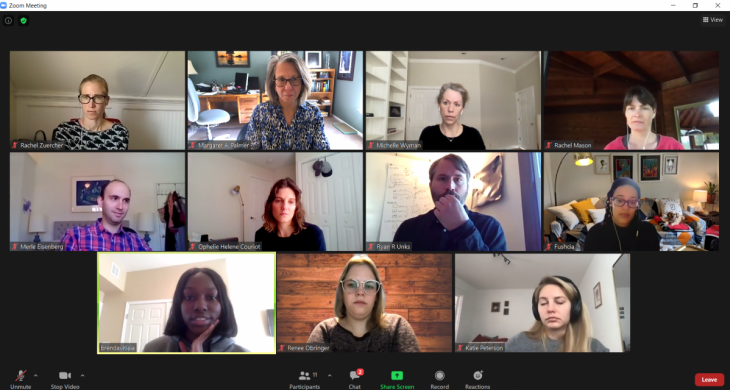As part of the Immersion Program’s ongoing professional development series, SESYNC postdocs recently explored the interface of science and policy during a discussion with Global Council for Science and the Environment’s Michelle Wyman and Brenda Vitisia. While discussing the importance of working with people from diverse backgrounds and with different values, Wyman and Vitisia shared some common approaches to building trust and finding common ground among stakeholders to advance environmental goals. They especially emphasized the importance of translating science into terms that everyone at the table can understand and that are relevant to individual interests.
To illustrate the critical role of language, Wyman and Vitisia then shared real-world examples they had experienced during their careers. These examples included squaring a federal recycling mandate with local-level waste management logistics in a cash-strapped municipality to liaising between United Nations and Kenyan government partners to promote durable solutions to environmental challenges. They explained the critical process of building trust among stakeholders and finding common interests and goals rather than pushing your own agenda.
Postdoctoral fellow, Rachel Zuercher, who facilitated the discussion, shares some takeaways from her fellow postdocs from the conversation below:
The discussion left many of us thinking about the political dimensions of both science itself—the questions we ask, and the ways that we approach those questions—and the issues that we engage with as scientists exploring social-ecological systems. The experiences shared by Wyman and Vitisia highlighted for us the difficultly of designing science-based policies at high levels when the outcomes of those policies are most acutely felt by those outside of the decision-making process. It underscored the importance of a critical consideration of power and influence in the systems we study and of the distributional costs and benefits of environmental policy.
The passion and optimism that both women brought to the discussion was a reminder of the wide-ranging career options available to interdisciplinary scholars—there is exciting potential for each of us to leverage our science to inform ongoing policy debates.
